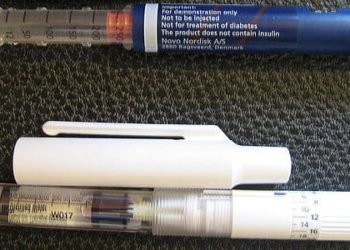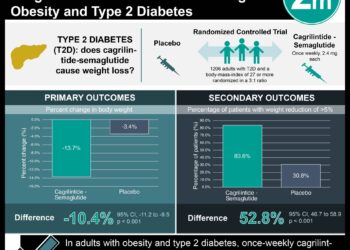Elderly diabetics potentially being over-treated
1. Despite unproven benefit and potential harm for hypoglycemia in complex geriatric patients while aggressively treating diabetes, there is no difference in proportion of patients attaining tight (HbA1C <7%) glycemic control across health status groups.
2. Of patients with tight glycemic control, over half were being treated with insulin or sulfonylureas, drugs with increased risk of hypoglycemic events.
Evidence Rating Level: 3 (Average)
Study Rundown: Tight glycemic control (HbA1C <7%) is not usually recommended for elderly patients with complex health histories and limited life expectancy, as the risk of hypoglycemia may be high. However, it is not well known if elderly patients are subject to tight glycemic control and thus are potentially being over-treated. This study aimed to examine the glycemic control of elderly patients and estimate the prevalence of potential overtreatment of diabetes.
This study found that among elderly adults with diabetes, there was no significant differences in the proportions of patients who attained tight (HbA1C <7%), moderate (HbA1C level 7%-8.9%) or poor (HbA1C level ≥9%) glycemic control across the different health status categories. Interestingly, 44.9% of patients with complex/intermediate health and 37.9% of patients with very complex/poor health had HbA1C level <6.5%. Of the patients with HbA1C <7%, just over half were being treated with insulin or sulfonylureas, drugs known for risk of hypoglycemia.
Strengths of this study include being a longitudinal study using a representative database for study participants. However, limitations include not accounting for cognitive decline in patient health status, thus this may have overestimated the number of healthy adults and underestimated potential overtreatment. Use of self-reporting to determine glycemic control drugs may be subject to recall bias. Also, this study was not able to look at incidence of hypoglycemic events in complex patients with tight glucose control.
Click to read the study, published today in JAMA Internal Medicine
Relevant Reading: CDA 2013 Guidelines: Targets for Glycemic Control
In-Depth [cross-sectional study]: This cross-sectional analysis used data on diabetic adults aged 65 or older from the National Health and Nutrition Examination Survey (NHANES) from 2001 to 2010. The patients were then classified into health status groups: relatively healthy, complex/intermediate health and very complex/poor health depending on their past medical history and functionality defined by their activities of daily living capabilities. Glycemic control was categorized as tight (HbA1C level <7%), moderate (HbA1C level 7%-8.9%) and poor (HbA1C level ≥9%). Types of glucose-lowering drug and insulin use were determined by self-report. Weighted proportions and logistic regression were used to analyze differences across glycemic control groups.
A total of 1,288 patients with diabetes were included in this study, of which 665 (51.6%) patients were deemed to be relatively healthy, 332 (25.8%) were in the complex/intermediate health group and 291 (22.6%) were in the very complex/poor health group. Among adults with diabetes, 61.5% (95% CI 57.5-65.3%) had tight control, 32.2% (95% CI 28.7-35.9%) had moderate glycemic control and 6% (95% CI 5-8%) had poor glycemic control. There was no significant difference in glycemic control across health status groups. Specifically, 62.8% of the relatively healthy, 63.0% of the patients with complex/intermediate health and 56.4% of those with very complex/poor health had HbA1c levels of <7% (P=0.26).
More from this author: Overall US diet quality improved from 1999 to 2010, Arterial catheter monitoring in ICU not associated with mortality benefit, Maintenance opioids in drug users linked with lower rate of hepatitis C infection, Delayed antiretroviral therapy initiation linked to decreased immunologic recovery in HIV, Tenofovir disoprovil fumarate HIV prophylaxis linked with minimal kidney impact
Image: PD
©2015 2 Minute Medicine, Inc. All rights reserved. No works may be reproduced without expressed written consent from 2 Minute Medicine, Inc. No article should be construed as medical advice and is not intended as such by the authors, editors, staff or by 2 Minute Medicine, Inc.









